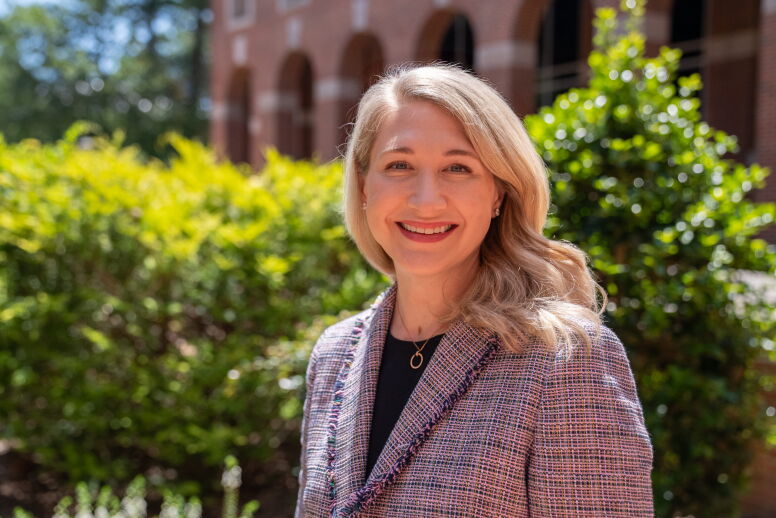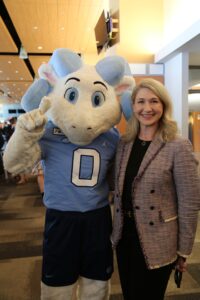News & Stories
A Tar Heel setting the standard

When Hillary Salo (BSBA ’02, MAC ’03) stepped onto Chapel Hill’s campus for the first time on a beautiful spring day as a high school senior from Wisconsin, she had no idea that visit would mark the beginning of a career that would shape the future of accounting standards in the United States.
“My mom looked at me and said, ‘I think I know where you’re going,’” she recalls.
More than two decades later, Salo returned to UNC Kenan-Flagler Business School as the 2025 Master of Accounting (MAC) commencement speaker — this time as vice chair of the Financial Accounting Standards Board (FASB), the very body that sets the accounting and financial reporting standards she once studied as a student.
Salo’s path to leadership in the accounting profession began with uncommon clarity.
“I took accounting in high school and really liked it,” she says. “It felt intuitive to me—something others found difficult came easily, and I saw that as a sign.”
That early interest led her to seek out the best business education possible at UNC Kenan-Flagler’s Undergraduate Business Program, followed immediately by the MAC Program.
Once at UNC Kenan-Flagler, Salo quickly found professors who would shape her future.
“C.J. Skender made intro to accounting exciting—even at 8 a.m.,” she remembers. “And Wayne Landsman completely changed my career.”
It was Landsman who encouraged her to apply for a post-graduate technical assistant position at the FASB after completing the MAC Program in 2003. At the time, she only vaguely knew what the FASB did. “I remember asking, ‘So this is a good thing, right?’” she says. “Turns out, yes—it was a very good thing.”
That one-year postgraduate experience launched her career in financial accounting and reporting practices. After the FASB, Salo joined KPMG, working in both the advisory and audit practices, including a rotation in its audit quality and professional practice group.
She then earned a prestigious fellowship with the Office of the Chief Accountant at the U.S. Securities and Exchange Commission in Washington, D.C., before returning to KPMG in New York in 2015 as a partner. But when the opportunity arose in 2020 to return to the FASB as its technical director—a rare, high-impact role overseeing the FASB’s standard-setting activities and staff—Salo couldn’t say no.
“I actually loved being an audit partner, which not everyone can say,” she says. “But the FASB role was too interesting and impactful to pass up.”
She served in that capacity for four years before being appointed vice chair of the board in 2024. That move felt like coming home.
“The FASB was where I started my career as an accountant, and it shaped my entire view of the accounting profession,” she says.
Salo brings a uniquely holistic perspective to her leadership at the FASB — combining experience as an auditor, a regulator and now a standard-setter.
“The strength of our capital markets depends on transparency and consistency,” she says. “Our job at the FASB is to provide guidance that presents the economics of transactions in a neutral, unbiased way. We don’t decide whether a transaction is good or bad — we make sure it’s clearly understood by investors.”
Salo draws on her diverse career experiences to evaluate potential standard-setting activities and balance the needs of different stakeholders. “At a very high level, preparers are concerned about cost. Investors want more transparency. Regulators want consistency,” she says. “Our job is to weigh all that and make the best decision we can for the system as a whole.”
That neutrality requires careful judgment and cooperation, something Salo says was ingrained in her during her time at UNC Kenan-Flagler.
“Life is a series of group projects, and Carolina taught me how to navigate them,” she says. The Business School’s focus on collaboration and communication, through structured pod-based courses and a memorable public speaking class, helped build confidence that has served her well across boardrooms and conference stages alike. “We counted our filler words when practicing public speaking in one class,” she says. “It was brutal but valuable.”
Salo’s approach also reflects a deep understanding of how accounting is evolving.
“Technology has changed the way we do our work,” she says, pointing to automation, analytics and AI as game-changers in reducing repetitive tasks and enhancing the importance of critical thinking. “The tools have changed, but what makes a great accountant hasn’t. You still need people who are curious, analytical and good communicators.”
Despite her prestigious title and resume, Salo is refreshingly humble about her career trajectory. “There’s no single path,” she told incoming MAC students. “Mine is just one example of what’s possible.”
Her top piece of advice for future accountants is to say yes—especially when it scares you.
“If something intimidates you, that probably means it’s worth doing. Some of my biggest career moves happened because I said yes when I wasn’t sure I was ready.”
That advice applies especially to the next generation of accountants, many of whom value certainty and clear answers. “Accountants love structure, but the best growth happens when you step outside your comfort zone,” she says. “And you’ll rise to the occasion—you always do.”
Asked about the most intellectually gratifying aspect of accounting, Salo doesn’t hesitate about her answer. “Solving puzzles. Every day brings a new question, a new transaction, a new scenario that doesn’t quite fit the mold. The challenge is to figure out how to represent it faithfully within our framework.”
Accounting isn’t about crunching numbers for Salo — it’s about understanding systems, analyzing implications and communicating clearly. “We’re not just historians of financial activity,” she says. “We’re translators of economic reality.”
It’s a responsibility she takes seriously—and one she traces back to her early days in Chapel Hill. “The education I got here prepared me to think deeply and lead confidently,” she says. “And I’ve never forgotten where it started.”
As she addressed the MAC Class of 2025, Salo urged graduates to stay curious and courageous. “You’re stepping into a profession with enormous influence and responsibility. We are the ones who champion transparency, uphold ethics and turn data into decisions. But more than that, we are stewards of trust. When I look out into this room, I don’t just see future accountants, I see future leaders. So, carry that responsibility with you. Lead with it and grow with it.”
In every sense, Salo embodies that trust. And in her story, future accountants can find both inspiration and a challenge: to lead with integrity and embrace future opportunities.
